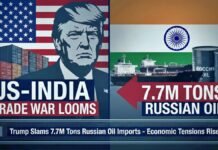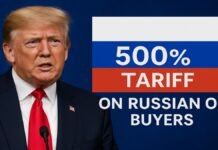
Key Points:
- US sanctions on Rosneft and Lukoil take effect November 21, 2025; UK sanctions effective November 28
- General license wind-down period expires November 21 for US entities; November 28 for UK
- Sanctions designate 34+ subsidiaries of both companies; any entity 50%+ owned by them also blocked
- India imported 1.62 million barrels Russian oil daily in October; October 2025 unchanged from September
- Indian refiners (IOC, BPCL, Nayara Energy) accelerating purchase orders before sanctions deadline
- US crude oil imports to India tripled to 568,000 barrels/day in October 2025
- India seeking alternative suppliers: Iraq, Saudi Arabia, UAE, Nigeria, Latin America
- Brent crude oil prices surged 5% immediately following October 22 US sanctions announcement
- No immediate ban on transactions, but wind-down general licenses expire November 21
- Chinese refiners also cutting Russian imports in anticipation of sanctions tightening
New Delhi: On October 22, 2025, the U.S. Department of the Treasury’s Office of Foreign Assets Control (OFAC) announced blocking sanctions on Open Joint Stock Company Rosneft Oil Company and Public Joint-Stock Company Oil Company Lukoil, Russia’s two largest oil producers and exporters, alongside 34 designated subsidiaries operating across upstream exploration, midstream pipelines, and downstream refining operations.
The sanctions represent the first major Trump administration action targeting Russia since the 2025 presidential transition, contradicting earlier speculation that Trump might pursue more lenient policies toward Russia. Treasury Secretary Scott Bessent stated directly: “Given President Putin’s refusal to end this senseless war, Treasury is sanctioning Russia’s two largest oil companies that fund the Kremlin’s war machine,” signaling that geopolitical pressures regarding the Ukraine conflict supersede prior speculation about sanctions relaxation.
November 21 Deadline: A Critical Inflection Point
The sanctions framework includes a carefully structured wind-down period lasting exactly 30 days from announcement to enforcement. General Licenses GL 126 and GL 127 issued simultaneously with the sanctions permit transactions involving Rosneft, Lukoil, and their subsidiaries only until 12:01 AM Eastern Standard Time on November 21, 2025. After this deadline, U.S. persons are absolutely prohibited from conducting any transactions involving these entities except through future specific licenses issued on a case-by-case basis.
This compressed timeline has triggered panic-buying behavior across global petroleum markets. Refiners worldwide have undertaken frenzied efforts to secure long-term contracts, accelerate deliveries, and prepay for shipments scheduled after November 21, recognizing that the sanctions will severely constrain transaction ability. Notably, the UK issued parallel sanctions with a slightly later wind-down deadline of November 28, 2025, and the European Union announced complementary transaction bans on October 23, 2025, with full restrictions on Gazprom Neft and liquefied natural gas import bans scheduled for January 2027.
India’s Refinery Scramble: Advancing Purchase Orders
India’s major petroleum refineries, Indian Oil Corporation (IOC), Bharat Petroleum Corporation Limited (BPCL), and Nayara Energy, have intensified crude oil procurement activities since the October 22 sanctions announcement, racing to maximize Russian crude acquisitions before November 21 restrictions take effect. Oil industry sources confirm that refineries have accelerated purchase orders through existing contracts and are negotiating expedited delivery schedules to ensure shipments are completed before sanctions eliminate transaction legality.
Nayara Energy, the Rosneft-backed refiner previously facing supply constraints over recent months, has emerged as particularly active in securing crude allocations. Following months of limited supply availability, Nayara successfully secured its full contractual crude oil allocation for October, and industry sources indicate the company is now aggressively pursuing additional supplies for November and December to build strategic inventory buffers.
Stable October Volumes, Anticipated Post-Sanctions Decline
Despite the October 22 sanctions announcement, India’s crude oil imports from Russia remained stable in October 2025 at 1.62 million barrels per day (bpd), unchanged from September 2025 levels. This stability reflects the fact that most import contracts were committed months in advance, and Indian refineries could not accelerate deliveries significantly within a single month despite the emerging sanctions threat.
However, oil industry analysts anticipate significant import volume increases in November and early December as refineries utilize remaining wind-down periods to front-load purchase contracts scheduled for post-sanctions delivery. Sources suggest Indian refineries may increase import quotas by 15-25% during the 50-day window between the October 22 announcement and the November 21 final deadline, representing perhaps 200,000-400,000 additional bpd of Russian crude securing contracted shipment status.
The 50% Rule: Blocking All Subsidiary Transactions
A critical element of the sanctions framework extends blocking requirements to any entity owned 50 percent or more, directly or indirectly, by Rosneft or Lukoil, regardless of whether that entity has been separately designated by OFAC. This “50% Rule” creates an expanding sphere of blocked entities extending far beyond the 34+ explicitly named subsidiaries, encompassing any corporate structure where either designated oil giant holds majority ownership.
For India, this provision creates substantial compliance complexity, as entities in Indian joint ventures involving Rosneft or Lukoil may face designation status. Numerous Indian refineries have joint ventures or long-term sourcing agreements involving both oil majors, potentially triggering secondary designation exposure despite never being named on OFAC lists.
US Crude Oil: India’s Growing Alternative
In anticipation of Russian supply constraints, India dramatically increased crude oil imports from the United States, tripling purchases to approximately 568,000 barrels per day in October 2025, a substantial increase from previous monthly averages. This strategic pivot reflects Indian refineries’ pre-emptive hedging against anticipated Russian supply disruptions following the November 21 sanctions implementation.
US crude oil, previously considered expensive relative to Russian grades and relatively expensive to transport to Indian ports, has become increasingly economically viable as Russian supply uncertainty creates premium pricing for alternative sources. Energy analysts anticipate US crude imports to India may further increase in November and December as refineries seek to offset anticipated Russian supply loss.
Diversified Sourcing Strategy: Middle East and Africa
The Indian government has formally stated that refiners retain complete discretion to source crude from alternative suppliers based on commercial considerations and energy security optimization. Government sources indicate India will pursue crude oil supplies from established sources, including Iraq, Saudi Arabia, the United Arab Emirates, West African nations (particularly Nigeria), and Latin America (Venezuela and Brazil) to offset Russian supply constraints.
Saudi Arabia and the UAE represent particularly important alternative sources, given their excess production capacity and existing relationships with Indian refineries. Iraq, despite political instability, maintains significant refinery relationships with Indian companies. West African crude oil, particularly Nigerian Brent-blend oil, offers advantages including lower transport costs to Indian ports compared to Middle Eastern alternatives.
Global Oil Market Shock: Immediate Price Volatility
The October 22 sanctions announcement immediately triggered petroleum market turbulence. Brent crude oil prices surged approximately 5% on October 23 trading, reflecting market participants’ assessment that sanctioning Russia’s two largest oil companies would constrain global supply and create supply-demand rebalancing pressure. This immediate volatility underscores petroleum traders’ conviction that sanctions will have a material impact on global energy availability.
Sustained volatility is anticipated through November 21, as market participants navigate the wind-down period uncertainty and adjust position holdings in anticipation of the transaction prohibition onset. Oil futures markets are pricing in potential continued upside pressure on Brent crude, reflecting expectations of persistent supply tightness and geopolitical risk premium incorporation.
Chinese and International Refinery Response
Not only have Indian refineries intensified Russian crude procurement. Chinese oil refineries, processing approximately 1.6 million bpd of Russian crude, substantially larger than Indian volumes, have begun modulating import schedules in anticipation of sanctions complications. Bloomberg reported that Chinese refiners are scaling back certain Russian crude orders while accelerating others to optimize supply before November 21, mirroring Indian refinery behavior.
This global refinery scramble creates ironic counter-pressure on crude oil prices. Simultaneously, sanctions pressure suggests tighter supply and higher prices. But the front-loading of purchases and acceleration of import schedules temporarily elevates crude demand, potentially moderating price increases by pulling demand forward from post-sanctions periods.
Compliance Risks and Material Support Designations
A critical vulnerability for Indian refineries and trading companies involves “material support” designations. OFAC regulations prohibit foreign persons from materially supporting, sponsoring, or providing financial, technological, or material support to sanctioned entities. OFAC has historically used material support designations to sanction foreign companies engaging in high-profile projects with Russian energy firms.
Indian refineries must navigate compliance complexities, ensuring their ongoing contracts with Rosneft and Lukoil conclude or receive authorized wind-down permissions before November 21. Additionally, refineries risk OFAC secondary sanctions exposure if they engage in “significant transactions” supporting Russia’s energy sector post-November 21, even through non-designated intermediaries.
The Broader Strategic Context: Ukraine Pressure and Trump’s Dual Messaging
Treasury Secretary Bessent explicitly attributed sanctions to “President Putin’s refusal to end this senseless war,” linking sanctions to geopolitical pressure regarding Ukraine peace negotiations. However, President Trump has simultaneously stated public hopes that sanctions will be “short-lived” and reversible if Russia accepts the ceasefire terms Trump prefers. This dual messaging—aggressive sanctions paired with implicit negotiation pathways characterizes the Trump administration’s Russia sanctions approach.
This strategic ambiguity creates uncertainty for energy markets and refineries. If rapid Ukraine ceasefire negotiations succeed, sanctions could theoretically be reversed or substantially modified, making long-term Russian supply contracts potentially viable again. Conversely, if negotiations fail, sanctions could deepen, creating further Russian energy sector isolation.
India’s Energy Security Calculus: Balancing Geopolitics and Economics
For India, the sanctions create strategic complications. India has long maintained economic relationships with Russia while simultaneously managing Western alliance relationships and NATO-sympathetic foreign policy considerations. The sanctions require New Delhi to navigate competing pressures:
Compliance Requirements: OFAC regulations apply to “US persons” and transactions “within or transiting the United States.” Indian refineries and trading companies must ensure complete transaction separation from US financial systems post-November 21, potentially requiring alternative payment mechanisms through non-US banking channels or currency alternatives.
Economic Optimization: Russian crude oil remains substantially cheaper than Middle Eastern alternatives, making Russian sourcing economically advantageous despite geopolitical complications. Post-sanctions alternatives (Iraqi, Saudi, UAE crude) command premium pricing, increasing refinery input costs and downstream fuel prices for Indian consumers.
Supply Security: Russia currently supplies approximately 15-18% of India’s crude imports. Abrupt sourcing diversification creates supply chain complexity and logistics challenges. Alternative suppliers operate at capacity constraints, potentially limiting India’s ability to fully offset Russian supply loss.
The November 21 Inflection Point: A New Energy Reality
As November 21 approaches, India faces a fundamental energy policy inflection. Post-sanctions, the structure of Indian petroleum imports will likely shift dramatically:
- Russian crude oil imports may decline 30-50% as transaction complications intensify and alternative supplies become comparatively accessible
- US crude oil imports will likely expand further, potentially reaching 800,000-1,000,000 bpd within 6-12 months
- Middle Eastern crude oil volumes may increase as refineries reallocate purchasing power
- Petroleum prices for Indian consumers may experience upward pressure as refinery input costs increase
For India’s economy, already managing inflation pressures and fiscal constraints, this energy policy inflection represents a subtle but consequential geopolitical shift. The transition from Russian energy dependence toward diversified sourcing reflects a broader realignment of India’s energy relationships within the context of ongoing Ukraine conflict pressures and American sanctions strategies.





















































